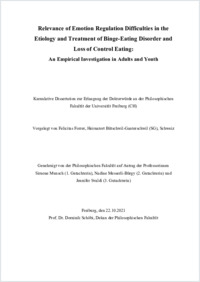Relevance of Emotion Regulation Difficulties in the Etiology and Treatment of Binge-Eating Disorder and Loss of Control Eating : An Empirical Investigation in Adults and Youth
SPR
- Forrer, Felicitas
- Simone Musch (Degree supervisor)
- Fribourg, Switzerland : [éditeur non identifié], [2021]
1 ressource en ligne (218 pages) ; 1 fichier pdf
Thèse: Université de Fribourg (Suisse), 2021
English
Binge-Eating Disorder (BED) and Loss of Control Eating (LOC) represent the most prevalent eating disorders (EDs) in adults respectively youth with detrimental consequences for mental and physical health. Recent studies indicated that emotion regulation difficulties are an important factor in the development and maintenance of BED/LOC, but little is known about the mechanisms and potential gender differences of how they relate to BED/ LOC. Interplays with etiological factors such as body dissatisfaction, body-related cognitive distortions and appearance-based rejection sensitivity (referred to
as interpersonal emotion regulation difficulties) can be assumed. Findings of publication 1 indicate that emotion regulation difficulties as opposed to body-related cognitive distortions might not mediate the relationship between body dissatisfaction and ED pathology in a community sample of women and men. Mechanisms of emotion regulation difficulties therefore need further clarification in clinical samples, whereas their relevance for the development and maintenance of BED/LOC remains undisputed. In line with this and given that more efficacious and accessible treatments are needed especially for youth
with LOC, publication 2 investigated for the first time the efficacy of a blended treatment program for youth with LOC, including interventions addressing interpersonal emotion regulation difficulties. Results indicate that blended treatments might be efficacious in reducing core LOC and depressive symptoms, whereas the treatment of interpersonal emotion regulation difficulties may need more profound and enduring interventions. Publication 3 complemented that increased emotion regulation difficulties at treatment begin might be a relevant predictor of particularly immediate treatment outcome in online
guided self-help for individuals with BED. While findings of publication 2 and 3 support the relevance of (interpersonal) emotion regulation difficulties in the maintenance and treatment of BED/ LOC in adults and youth, results from publication 1 also indicate that emotion regulation difficulties do not represent a sufficient condition to elicit BED/ LOC. Mechanisms of difficulties in emotion regulation in the etiology of BED/ LOC need to be investigated more differentiated in terms of specific aspects of emotion regulation
difficulties in clinical samples suffering from increased emotional distress. It is proposed to enhance clinical and scientific efforts to include emotion regulation difficulties in the diagnostic assessment, prevention and treatment of BED and LOC.
as interpersonal emotion regulation difficulties) can be assumed. Findings of publication 1 indicate that emotion regulation difficulties as opposed to body-related cognitive distortions might not mediate the relationship between body dissatisfaction and ED pathology in a community sample of women and men. Mechanisms of emotion regulation difficulties therefore need further clarification in clinical samples, whereas their relevance for the development and maintenance of BED/LOC remains undisputed. In line with this and given that more efficacious and accessible treatments are needed especially for youth
with LOC, publication 2 investigated for the first time the efficacy of a blended treatment program for youth with LOC, including interventions addressing interpersonal emotion regulation difficulties. Results indicate that blended treatments might be efficacious in reducing core LOC and depressive symptoms, whereas the treatment of interpersonal emotion regulation difficulties may need more profound and enduring interventions. Publication 3 complemented that increased emotion regulation difficulties at treatment begin might be a relevant predictor of particularly immediate treatment outcome in online
guided self-help for individuals with BED. While findings of publication 2 and 3 support the relevance of (interpersonal) emotion regulation difficulties in the maintenance and treatment of BED/ LOC in adults and youth, results from publication 1 also indicate that emotion regulation difficulties do not represent a sufficient condition to elicit BED/ LOC. Mechanisms of difficulties in emotion regulation in the etiology of BED/ LOC need to be investigated more differentiated in terms of specific aspects of emotion regulation
difficulties in clinical samples suffering from increased emotional distress. It is proposed to enhance clinical and scientific efforts to include emotion regulation difficulties in the diagnostic assessment, prevention and treatment of BED and LOC.
- Faculty
- Faculté des lettres et des sciences humaines
- Language
-
- English
- Classification
- Psychology
- Notes
-
- Ressource en ligne consultée le 2021-12-09
- License
- License undefined
- Open access status
- gold
- Identifiers
-
- SWISSCOVERY 991170830134805501
- URN urn:nbn:ch:rero-002-120310
- Persistent URL
- https://folia.unifr.ch/unifr/documents/312303
Statistics
Document views: 255
File downloads:
- ForrerF.pdf: 312
